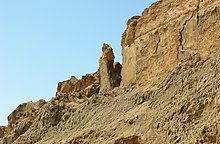Mount Sodom



Mount Sodom (Hebrew: הר סדום, Har Sedom) is a hill along the southwestern part of the Dead Sea in Israel; it is part of the Judaean Desert Nature Reserve.[1] It takes its name from the legendary city of Sodom, whose destruction is the subject of a narrative in the Bible.
History
[edit]Mount Sodom began its rise hundreds of thousands of years ago and continues to grow taller at a rate of 3.5 millimetres (0.14 in) a year.[2]
Movements of the Great Rift Valley system, along with the pressure generated by the slow accumulation of earth and rock, pressed down on the layers of salt, creating Mount Sodom. It is about 80% salt, 220 metres (720 ft) high, capped by a layer of limestone, clay and conglomerate that was dragged along as it was squeezed up from the valley floor.[3]
It is approximately 8 kilometres (5 mi) long, 5 kilometres (3 mi) wide, and 226 metres (742 ft) above the Dead Sea water level, yet 170 metres (557 ft) below world mean sea level. Because of weathering, some portions have separated. One of these pillars is known as "Lot's wife",[4] in reference to the Biblical account of the destruction of Sodom and Gomorrah.
See also
[edit]References
[edit]- ^ Mattes, Johannes; Christian, Erhard; Plan, Lukas (2018). Proceedings of the 12th EuroSpeleo Forum: Ebensee, Austria, August 23rd-26th, 2018 : Connecting Science. Speleological Society of Ebensee. ISBN 978-3-903093-30-0. Retrieved 6 May 2020.
- ^ Hareuveni, Imanuel (1985). קום התהלך בארץ: מדריך שמורות טבע בישראל [Nature Reserves in Israel] (in Hebrew) (2nd ed.). Israel: Israel Ministry of Defense. pp. 406, 409. ISBN 965-05-0193-2.
בחלקהּ הדר' של הבקעה מתרומם הר סדום (פסגתו 240 מ' מעל פני ים המלח. ארכו כ-11 ק"מ ורוחבו כ-2 ק"מ), לו נוף מיוחד של עמקי אורך ורכסי אורך, שכיוונם הכללי צפ'-דר' והבנוי, בעיקרו, סלעי מלח." "ראשית התרוממות ההר החלה לפני כמה מאות אלפי שנים. ב-20 אלף השנים האחרונות התרומם ההר בקצב של 3.5 מ"מ בשנה, והתרוממות זו נמשכת גם כיום.
- ^ Ruby, Robert (18 December 1991). "Punished for looking back, Lot's wife may fall forward". The Baltimore Sun. Archived from the original on 4 March 2016.
- ^ Lefond, Stanley J. (2012). Handbook of World Salt Resources. Springer. p. 337. ISBN 978-1-4684-0703-7.
